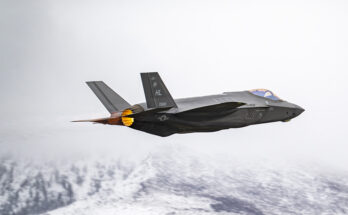
Boeing is under increasing pressure from both the U.S. and Israeli governments to fast-track production of its F-15EX aircraft. In August 2024 the U.S. approved the possible sale of up to 50 new F-15IA (Israeli F-15EX variant) for Israel. The US$18.82 billion sale also included mid-life upgrades to Israel’s fleet of 25 F-15I fighters to the F-15EX avionics configuration. However, these aircraft may not be delivered before 2029.
Israel initially expressed interest in bolstering both its F-35 and F-15 aircraft in 2020, but internal political turmoil delayed the process. F-35 procurement plans moved forward but the F-15 deal never materialized. In January 2023, the Israeli Ministry of Defense (MoD) sent U.S. officials a formal Letter of Request to procure 25 F-15EX fighters, reigniting purchase plans.
This urgency is driven by escalating regional tensions, particularly concerns over Iran’s growing ties with Russia, which could see Tehran acquire Russia’s advanced S-400 air defense system. The Israeli Air Force (IAF) views the F-15EX as critical to countering these threats, especially in striking heavily fortified targets.
Boeing contends the F-15EX can carry more weapons than any other fighter in its class. While both the F-35 and F-15 are advanced jets, they serve different roles and do not compete for missions or funding, according to the U.S. Air Force. The Lockheed-built F-35 excels in stealth capabilities, making it ideal for penetrating heavily defended airspace, while Boeing’s F-15EX boasts greater payload capacity and range, making it well-suited for deep-strike missions, like targeting underground Iranian nuclear sites. In an optimal scenario, the F-35 would first neutralize enemy air defenses, clearing the path for the F-15EX to conduct its strikes.
Meanwhile, in Washington, the F-15EX has become a major priority in Air Force procurement. Earlier plans had centered on the F-35 as the cornerstone of the future fighter fleet, aligning with the Air Force’s goal of transitioning to an entirely fifth-generation-and-beyond force. However, the FY2020 request for F-15EXs marked a shift in this strategy. The Air Force later defended the request for two main reasons: the operating costs of the F-35 were considerably higher than those of fourth-generation fighters like the F-15EX, and the service needed to acquire 72 new aircraft annually to sustain its fleet size as older planes are phased out.
At the same time, regional U.S. allies such as Saudi Arabia and Qatar are pushing to modernize their air forces, intensifying competition for fighter jet deliveries. This high demand could lead to production delays for foreign buyers, increasing competition between nations vying for priority in the production queue.
Aja Melville is an accomplished editor and analyst with expertise in open-source intelligence (OSINT) and database management. As the Weapons Editor and Analyst at Military Periscope, Aja has applied her analytical skills and in-depth knowledge in military affairs and global defense sector advancements, particularly focusing on China and the Asia-Pacific region.
Aja's commitment to international relations and Asia-Pacific focus is highlighted by her educational background. She holds a Bachelor of Arts in International Relations and Chinese Language from Bard College, complemented by a Certificate of Advanced International Studies from the Bard Globalization and International Affairs Program. Aja further expanded her linguistic skills with a Certificate of Intensive Language Studies in Chinese (Mandarin) from Qingdao University.




